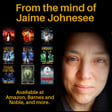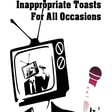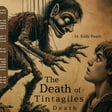Become a Creator today!Start creating today - Share your story with the world!
Start for free
00:00:00
00:00:01

Education Panel of Teachers Discusses the New Regime.
Three Michigan educators discuss the incoming regime (recorded in late November). Actionable tips on local organizing, resistance, "weaponizing empathy," School of choice, Title IX, and more. A full transcript of this episode can be found here.
Transcript
Introduction to Neurodivergence and Creativity
00:00:02
Speaker
You are listening to The Mentally Oddcast, where we talk with creatives about neurodivergence, trauma, addiction, and all the other things that impact and inform our art. Our goal is to show everyone that no matter what you're going through, you are not alone and you can make art about it.
Educational Discussion Format Shift
00:00:34
Speaker
Hello, friends. You are listening to The Mentally Oddcast. My name is Wednesday Lee Friday, and we are once again diverting from our normal format of one-on-one interviews with creatives. We are having our education show today. We have some educators with us, and we're going to be talking about what is already happening in education and what could potentially happen with the new administration, and hopefully focusing on a lot of actionable tips about what you can do about it. um So let's start out with some introductions.
Teaching Experiences: Reading and Early Education
00:01:10
Speaker
Debbie, why don't you go first, ah tell us what it is that you teach, what grade level. And also I want everybody to tell us your favorite book. So please, Debbie. Hi, everyone. I'm Debbie.
00:01:25
Speaker
And currently I am teaching middle school and high school reading intervention, but I also have an elective class called humanities where we talk about the humanities. Um, but you know, I've taught pretty much anywhere from kindergarten up through, oh, actually preschool. I've done preschool too. So I've pretty much done it all 27 years um or more. Um, let's see.
00:01:55
Speaker
favorite book i'm gonna have to say i have i have several of course but most recently the book i fell in love with was the house and the cerulean sea by jt clune so cool yeah we'll have links in the description all right laura go right ahead oh my goodness um I'm Laura. I currently teach Young Fives, which is like a developmental kindergarten. And I've been teaching for over 30 years, mostly in early elementary, early childhood. But I have also worked in lots of different elementary levels, including sixth and eighth grade reading intervention as well.
00:02:48
Speaker
I think my favorite book for this would be A Tree Grows in Brooklyn, since we're talking about education. It's a great book that kind of gives you an introduction, kind of and what education looked like at the turn of the 20th century, since we're in the 21st century, and it's very apropos to what we're talking about today, I think. Cool, cool, Andrew.
Personal Interests and Teaching Reflections
00:03:15
Speaker
Hello. So I teach honors physics and AP physics in high school. I've been teaching for 34 years. I'm going to go with the books that I've read the most as opposed to favorites, which I suppose i every three or four years I tend to read through the Hobbit Lord of the Rings series. Nerd. I'm a physics teacher for a reason. Fantastic. um So let's first start out, um, the new administration has not officially taken effect.
Educational Challenges and Misconceptions
00:03:51
Speaker
So we don't know what president Musk, Oh, excuse me. We'll have in store for us. Um, but we do know a lot of things are happening already as a sex writer. I know that national standards for sex ed do not exist and that that's appalling. But like the problem obviously is much more wide sweeping than that.
00:04:14
Speaker
Um, so how, what are your, your thoughts about what's going on already? Um, you mean like in the past two years or.
00:04:28
Speaker
Well, I know there's been, there's been book bannings, but like things that are, uh, changing about education and sort of, um, I mean, there's there's so much, there's the idea that teachers should be armed to prevent school shootings. That's pretty new.
00:04:43
Speaker
rampant ah book bandings, like there's always been a few squeaky wheels thinking there should be book bandings, but now it it seems much more excessive. Does it just seem that way or or is it that way? I mean, maybe um the news just makes it seem worse than it is. It seems that we're choosing
00:05:06
Speaker
trigger words or trigger concepts or ideas to make people fearful of what's happening in schools these days, I think. and it it just I think it's just a lot of fear mongering and making the public schools seem like a scary place that we don't want to support or that we don't want to trust.
00:05:28
Speaker
I think they're trying to undermine trust in public education in general. Um, so that is very disheartening and very, very frustrating as a public educator, public educator. Yeah. Have any of you experienced, um, the information that you're allowed to give students being restricted? I know there are certain historical events that people don't want to be taught anymore.
00:05:58
Speaker
I'm hearing things like slaves being referred to as workers, um just a lot of ah not wanting to teach accurate American history because it makes white
Curriculum Support and Controversies
00:06:12
Speaker
kids feel bad. Like I've heard that said, and I don't know how prevalent that idea is, because I'm not in the school system. That's why you're all here, because you know what's up, and I i really don't. So has has that happened to any of you? I wish Bray was here. we had another speaker who teaches um university level biology. We also were supposed to have the mom of a special needs a student here to talk about some of her experiences, but because she is the mom of a special needs student, she could not make the time to be here. Apparently that takes up a lot of time, I'm told.
00:06:47
Speaker
um But have any of you experienced that, that you weren't allowed to teach something that you would normally teach? I don't think that's come up so much in my district, but in neighboring districts it has. And I know my husband's district, which is Andrew sitting right next to me, it's come up a lot in his district where that's been a controversy. You hear it being argued in the board meetings. It's come up in our board meetings, but it hasn't been and an issue that's actually within our our curriculum. And our district my district has been supportive of what our curriculum is. um It isn't something that really has has has been an issue. We we teach what has has really happened. at the At the elementary issue, it hasn't been an issue. And at the secondary um level, it hasn't really been an issue yet.
00:07:46
Speaker
We in fact just had, it was interesting, we just had a ah board meeting where we were getting some books um looked at for a new English course or a or of actually an English course that's already in, but they wanted to change some of the books that they were using in the English course. And the conversation had started a few months ago when they were first bringing up the discussion and then they were voting on it a couple months later.
00:08:12
Speaker
And a couple months ago, it wasn't an issue, but then all of a sudden they wanted to have the titles looked at again, so they had to put it on hold while they relooked at the titles. And it was just kind of interesting to see what had changed in us and a couple of months, because they wanted to look closer at the titles to see what the titles were all about. but It really wasn't anything that was controversial. In fact, one of the books they wanted to replace was Lord of the Flies because it was just something that that the teachers were kind of tired of teaching and they wanted to replace it with things that were a little bit more modern for some of the kids to look into. And it's just fascinating to me how something that wasn't controversial
00:08:53
Speaker
um a couple of months before all of a sudden became controversial and it was the same people that were involved in voting all of a sudden had to rethink it probably because of some outside pressure that they were getting of oh now what are in these titles we need to look into these things now so it's just interesting how some things get bad reputation just because of the title of them, social emotional learning is one of them. The DEI, where you're talking about discrimination and and those kinds of things.
Social-Emotional Learning Misunderstandings
00:09:23
Speaker
And we have to educate our families and our community that I teach social emotional learning every single day, what it is is I'm teaching my children how to handle big feelings and being angry. And if they're eliminating social emotional learning, like some of them want to, I can no longer teach my five year olds how to calm down.
00:09:43
Speaker
So how am I supposed to do that? Why is that a bad thing? Somehow they think I'm indoctrinating my children if I'm teaching them social-emotional learning. One of our board members that had been running a couple of years ago is quoted in saying that critical race theory is essentially the same thing as social emotional learning. yeah Like, what? What? Make that connection for me, please. di is it that They ought to think it's all lumped in there together. DEI, social emotional learning learning, and critical race theory are all the same because we're somehow teaching
00:10:21
Speaker
So basically it's like it' a campaign against emotional intelligence. That's all lumped in there together with that. And like, no, I'm not. I'm actually teaching children how to handle conflict and how to solve problems. And it's so frustrating because the people who are saying these things have pretty much proven that they are clueless about what's going on.
00:10:46
Speaker
in the classrooms, in the public schools. And it's just this really bizarre narrative that's like, it's a dystopian world narrative that all these evil boogeyman acronyms that, oh, that no one seems to understand and they're making them out to be these horrible things, but yet they really have no clue what they really are or how they're being dealt with in the schools, in classrooms.
Vulnerable Groups and Empathy in Education
00:11:16
Speaker
Yeah, it does seem like there's an awful lot of ignorance about really vulnerable demographics, you know, gay people, trans people in particular. And I mean, just in terms of how much time and money is being spent, making sure that, you know, two kids in a district can't go out for soccer or whatever, like, I don't understand the value of that. And it seems very much like, Oh, very much so. Look over there. Very much so.
00:11:47
Speaker
It also seems like the very idea of of things like tolerance and empathy um are being like, I mean, mocked, like openly mocked, like kids are being made fun of and and adults are doing it. I mean, the people that are about to come in this next administration, they're a bunch of playground bullies.
00:12:09
Speaker
like name calling, pointing, jeering, bullies. Like that is what is coming back into fashion. How do you combat that when you're teaching younger children? In my district, we recently had a board meeting where one of our our illustrious members said that we were weaponizing empathy, which I'm in the process of making a t-shirt of. I want one, Andrew, just saying. Great phrase, weaponizing empathy, where we were teaching children to accept anything and everything. And therefore, we were weaponizing empathy, which I guess is some right wing meme that he picked up somewhere. And and now when and when asked by another board member how we were whether his child had ever experienced that he said no. But yet, you know, here's what he's worried about.
00:13:02
Speaker
yeah we We had to, in my district, we had to remove, we had some teachers had these little so little tiny little rainbow stickers on our door that said, safe space. Just as a signal to any kids who needed a safe space. From your gay straight alliance club. Yep, from our gay straight alliance club. And which, by the way, we can't call the gay straight alliance club. It's always called the GSA. And and we
00:13:33
Speaker
And and the the board voted to remove those those stickers. And then they were going to replace them with some sort of sticker that was as supportive of everyone. Now, needless to say, once they came around and scraped all the stickers off the door, they never got around to making the other sticker in the last year and a half.
00:13:54
Speaker
But yes, yes, but the but the rainbow stickers were all ah taken away because I guess we were again, that same board member said we were using them as as signaling just to show kids at some people. Yes. I'm reminded of a protest where ah multiple protests, really, where people were trying to convey the idea that black lives matter.
00:14:25
Speaker
Right. Oh, yeah. The response to that was that all lives matter as sort of ah a contradictory like, no, no, no, you aren't allowed to say that these lives matter. We have to say that all lives matter. But yet it also seemed like ah migrants who were desperate to get away from what they were living with and and come here for a better life. Suddenly, all lives did not in fact matter. It's It seems like accountability might be lacking for those things. um Let me be very frank, if I may. These people are full of shit. They aren't trying to protect children. If they were, they would do something about, you know, guns, pregnancy, drugs, depression. um It seems to me, and and the the studies do bear this out. i I didn't want to throw a lot of numbers at everybody, but
00:15:17
Speaker
um When you create an inhospitable environment for any demographic, the mental health and and then the physical health of that demographic declines. Making sure that no one has a safe space makes those who really need a safe space be stressed out all the time. schools When I was in school, schools did a terrible job dealing with bullies.
00:15:45
Speaker
And I'm sure that it's better in some ways, depending on where you are. and But there's, there's a long way to go as long as people are still fighting for their right to like be mean to gay people or whatever people's problem is. I think one of the things that has really changed since we all have been in school with those bullies in particular is now we have social media. So these kids really cannot escape being bullied, at least like when we were at school, the bullying happened mainly at school.
00:16:19
Speaker
But now that this follows these children 24 seven.
Bullying: Online and Offline
00:16:24
Speaker
um And that really compound compounds that mental health crisis. And unfortunately, schools are very limited in how they can, I guess, discipline when things are not necessarily happening happening within school. So it has really, really just compounded the problem. And schools, I don't know,
00:16:49
Speaker
if we know really even how to deal with it other than just communicate with parents as much as we can, but when the parents are very much hands off on how their children are using technology or even just ignorant about what is going on within the phone that their kids have in their pockets, um it's really terrifying, honestly.
00:17:12
Speaker
So I like super rage when I find out that people are like deliberately hiding information from kids out of the like the idea that they need to be kept innocent, especially once you get to like sixth grade or whatever I'm not saying talk to them like adults but Kids know things. Kids know about racism. Kids know that, you know, bad things happen in the world. They know what sex is. They know a lot of basics unless that's been deliberately kept from them. I mean, is that am I imagining that or is that a thing now that people are much more into keeping information from kids? Speaking as an early childhood educator, parents do want to bubble wrap their kids.
00:17:56
Speaker
Unfortunately, kids are very well aware, but they understand it in the context of their age. So if they're not giving developmentally appropriate information and their parents aren't there to supply them with that, then they believe it as a five-year-old, if that makes sense. So what happens then is they build a lot of misunderstandings ah around it, because they don't really understand. So they hear news, they know what's going on in the world, but they understand it but mixed with the most fantasies and understanding as they as they do, with all their other information, and it all bingles up inside their brain.
00:18:39
Speaker
and so they don't have a good grasp because they don't at that early age understand the difference between fantasy and reality yet and so it drives me insane when parents won't sit down and you don't have to go into grand details when something tragic happens in the world but you should give them ah just ah enough understanding of what they of what they need to hear so that they would have a basic understanding of something that happened.
Parental Involvement and Safe Spaces
00:19:11
Speaker
um For example, when 9-11 happened, um you know there were there were daycares and and elementary schools all around where children saw what was happening in the world. And there were parents who didn't want to explain to them what happened. So kids were were in trauma for what happened because they saw the news. They heard their grownups talking. There were actual children in New York City who saw the buildings go down.
00:19:34
Speaker
And if they were trying to hide what happened those days, those kids were having dreams and nightmares about what what happened and ah no understanding versus the parents that would sit there and and and actually tell them there were some bad people who flew planes into the buildings and this is what happened. But as adults, we're going to do our best to keep you safe and hopefully this will never happen again. And you just listen to their questions and you try to answer them as matter of factly as you can with just the information that they need to know.
00:20:03
Speaker
If somebody close to them dies, you try to give them just the basic facts that they need to know. You don't have to go, like I said, into the details. they should grow up knowing what the real names of all their body parts are. You say penis just like you say nose and eyes the whole time when you're changing a diaper from the minute they're born on up so that they know what their body parts are. You don't have to give them silly names so that they can tell somebody if something happens to them that they feel is inappropriate. That's just what you should do. You don't have to go into specific details with it with
00:20:40
Speaker
ah you know sex and everything at that age, but they should have a ah very basic understanding of their body. That's just what you do. um I have parents all the time that think that their child is being bullied because somebody in the class called their child a banana or somebody in their class pushed them um on the playground and they think that's being a bully. And I have to try and explain to them that, no, that was a child being mean. And this is what five-year-olds do. There's a difference between bullying and being mean. And I'm trying to teach your child to use their voice and advocate for themselves.
00:21:16
Speaker
And I will let you know when it turns into a bullying situation, there's a complete difference. But parents don't understand that. We have parents at some level that that hover way too much and protect their child way too much from some things, but then are involved in some of the more important things that they need to be involved in.
00:21:39
Speaker
So it's a very strange mixture. Some of the things that they need to be involved in, they aren't. And some of the things that aren't an issue, and they're way over involved in, they are. Yeah, I would agree with that. And Andrew, you and I teach about the same level. And I don't know how many ditty jokes you hear at the high school. But all the time, every day, ditty comes out of someone's mouth. Or someone sneezes and says, hach tula.
00:22:09
Speaker
So, you know, it, and I think a lot of times a lot of the teachers are even they're more, they're clueless about this stuff because they don't keep up with it. You know, I happen to keep up with that. And so I will give the kid a look and um I don't live under a rock, y'all knock it off. I had a student write a poem about how he gave his girlfriend a pearl necklace. I'm like, yeah, you may want to change that.
00:22:36
Speaker
Oh, yeah, they think I'm dumb. That is hilarious. Well, I mean, I can remember being in second grade thinking the teacher lived at the school and wondering why it took them so. you Remember that when you're young enough that you think teachers live at the school? Yeah,
00:22:57
Speaker
yeah so I think there's just so much that these kids see and hear. And if they don't talk to their parents about it, you know, we as teachers get to hear all these peer interactions but between these kids. And just, yeah, it's, they know way more than, than parents, I think, think they know. Which kind of leads us back into the, the save space discussion. I mean, kids are doing this, parents aren't stepping in. um What, I mean, how does that all, like,
00:23:30
Speaker
I mean, don't explain the the entirety of education to me, but like, what do you do? Is that just something that you have to deal with on a kid by kid basis? Cause I mean, there's like 40 kids in a classroom now, right? Thankfully. i feels ah gar it's One of the things that the new administration is talking about is, well, but we'll just kind of go through these things one at a time.
Religion in Public Schools: Legal Concerns
00:23:55
Speaker
Um, teaching the Bible in a public school classroom.
00:23:59
Speaker
Is any anybody, are her teachers really going to do that? I mean, I'm sure some will, but. Well, I think, I think that's even in the states that are trying to pass that the ACLU is, is fighting that in court. So I, you know, that's something that we'll see. I know that's one thing that, that Trump is, is saying that they're going to try to pass if, um,
00:24:24
Speaker
if they do get um If they do keep the Department of Ed or get rid of it and pass something along the lines that they get to, if you're going to take federal money or whatever, that they're going to try and pass some kind of loyalty oath for teachers. That's one thing they're looking at too, where it'll be these patriotic things, including taking those kinds of oaths and what will they what will that be? and the Bible is you know possibly one of them, Ten Commandments is possibly one of them. So I don't know, we'll see we'll see what districts do, because if that's all part of it, then it'll depend on, you know, like in Wicket, if they cart us off to jail, or if we lose our license, you don't I don't know, because um I definitely would be one of those ACLU lawsuits. That's for sure, because I don't believe in it.
00:25:18
Speaker
And Laura, what I find interesting is like all these things they want to make us do, the general public doesn't even know what we are. being mandated to do. you know On social media, I always see that meme, repost if you or react or like this post if you think the national or the um Pledge of Allegiance should be set in every classroom. It's state law. We have to. We have to provide that opportunity for kids every day. And it's state law that we have an American flag in each classroom. no like Just shut up. We do it.
00:25:55
Speaker
It's so frustrating. that way When I was in fifth grade, we had to say the lordship Lord's prayer after the Pledge of Allegiance. And there was me and one other kid who didn't know it. And the teacher called us heathens. And I didn't know what a heathen was either. So yeah, and I didn't The thing is I know now that if I had gone home and told my mom that the teacher called me even for not knowing a prayer, my mother would have raised holy hell. We would have seemed very religious with my mother raising holy hell. But um yeah, I didn't know. I just knew I was in trouble. So I didn't go home and tell my mom I got in trouble at school because like, why would I? But that stuff is pretty terrifying. And I know just because I give money to, say, Tanek Temple.
00:26:42
Speaker
And I know they fight a lot of these, you know, like, Oh, we're going to do religion. Great. Here's after school Satan club. And then, you know, people back down. and But that seems to be reaching its end because before people didn't want to say, Oh, we want religion, but we only need mean my religion. But people, you know, because haters taking over the oval has emboldened a lot more haters.
00:27:09
Speaker
People are much more bold about saying, no, Jesus, my Jesus. ah I get texts every day from the ACLU and from a couple of other groups that say, well, this is what we're gearing up to fight. So give me your money. So I know that you know they're already getting the lawsuits ready to go. so Yeah.
00:27:26
Speaker
That brings me to another point really, which is that the the new president is a monster and also a Republican. The House, the Senate, both red, SCOTUS is completely stacked. So things are coming down at a federal level, which you know none of us are going to be have enough power to to do anything about, but at the local level,
00:27:53
Speaker
And I don't want to get too far ahead of ourselves, but that's really where the power is, right? School board meetings and, and, and concentrating on what is happening in in your district directly. Am I, am I right about that? Again, that's out of our control. And if funding ends up being cut because of all of these program shifts that are, that seem to be impending, um, that's the part that really worries me.
00:28:21
Speaker
and what those cuts look like and where the money will come from if it's going to be replaced from some other place and what those cuts could look like for your average public school in a small community. Was there a lasting impact to what Betsy DeVos did when she was Secretary of Education? Yes. Can you can quantify that? I'd love to hear what she changed and and what remained that way. I don't know if it remained that way, thankfully, because we here in Michigan, we've had somewhat of a buffer having an amazing governor that understands the importance of, yeah, Big Red's goal, understanding the power of having funding for education. um I do know that
00:29:10
Speaker
that Betsy really was looking at strengthening the whole concept of charter schools and private schools receiving voucher money, taxpayer money. And I know that's part of the whole Project 2025 as well and strengthening that. um So I just think that what she instilled was a framework of thinking about that and making parents somehow feel that they're being cheated.
00:29:38
Speaker
out of this right that they supposedly have for the way they their money is being their tax dollars are being spent. I know that some states, I actually don't even know if Michigan is one, but where school funding is determined by property taxes. Well, it's it's it's changed. It used to be that way. um It's now a combination of things. There's tax money that goes into it. There is some property taxes that go into it.
00:30:05
Speaker
But schools right now in Michigan all have us the same basic amount of money per student. You get a per student foundational grant. And then there's some categoricals that go above that based on different things. How many students do you have that fit into this category? You might get some extra monies. But the thing in Michigan that separates one district from another is their ability to pass bonds.
00:30:30
Speaker
and bond bonds can be used to do things like build buildings and buy buses and you know they're for big they're for big and technology, they're for big things. And those have to be be passed in elections, but that is not equal. So even if your district may get the same amount of money per student as another district, um if they have a good,
00:30:57
Speaker
a good base, an industrial base, they might be able to pass some bonds very cheaply that will generate a ton of money that they can use to build themselves a new school when they need to. And, you know, as well as other districts can't do that. Another thing I think that makes funding challenging here in Michigan um is the school of choice option for parents. So we do parents actually do have choice of school districts within the public schools as long as they can get their child to another district that's accepting school of choice students, they can. So we in my area, we have a lot of students that are being sent to my district and other area schools that don't necessarily live in that district. So when it comes time for voting for bonds, you might actually, my own children go to the school where I teach, but we don't live in that community. So when I vote, my vote for tax increases and bonds is to support the school district where my children don't go.
00:31:57
Speaker
which i I still do that because I believe in the public schools, but I choose to bring my children with me to my district. and then fred So ah go ahead that's problematic because then let's say when there's a school board election, we have a lot of parents who really support the school, or who may but they don't live in that community. And so they can't even vote for the school board for where their child is going.
00:32:21
Speaker
So even within public school systems here in Michigan, we have that we have this disconnect between tax dollars going towards where your child actually goes to school or your election your election power.
00:32:33
Speaker
your voting power does not follow that. And that is how we're growing um for count day because that's how you make your money is on 90% of your funding comes on that first count day and October is by how many students are sitting in seats on on that day.
00:32:51
Speaker
um which is vitally important and um there's a couple of things that that come from that but ah we're losing population in Michigan and so we fight desperately for students and the really the only way you can grow anymore is by getting students from other districts so it's really competitive to get those yeah it's cutthroat from other districts and it's frustrating because sometimes you have those problematic families that don't seem to know how to how to just exist in society without being a pain in the ass and so they get well i'll just take my kid to this school and so then they leave and you're like bye and then they just school hop which is not good for the children and a lot of times charters are going to take
00:33:39
Speaker
take whoever they can get until count that 90% count day comes in October. And then, you know, because their problems as soon as that count day is over, and they get that money, they ship them back to their home school. And then the public school has to take these, you know, they they're usually either behavioral issues or they're very expensive special education kids. And the public's woefully behind. Yeah, has to take care of them. Are more people going to be homeschooling in the future? Do you think I know what's happening in our area around here is we're getting these um ultra conservative religious um conservative um families that are building these little co-op homeschooling coalitions that are opening up too. And so I think you're getting those too. But when i think since COVID, a lot of schools have gone, a lot of children
00:34:34
Speaker
just never made it back to school. They're doing virtual online school now. And I know that some of them are using some of the public school resources that they're entitled to through the school too. So it's interesting that they get to use some of the, because I know we serve as some of the kids like in speech and some other things. Yeah, we have some homeschoolers that go and do band or play sports. Yeah, or sports, yeah.
00:35:03
Speaker
and or come in for specials and other things. And yeah it's it's interesting to see how about they'll use some of the services, but because they want to, because of politics or religion or other things, they stay out. But the public school as well, our public school, we started our own virtual school to service and we get probably about 25 kids, K through, or elementary kids that go through our or online that never went away after COVID.
00:35:35
Speaker
each year. Yeah, we have an area school that has a virtual wow, a virtual school. It's just satellites. And I think it adds 800 students to their funding that they get to count.
Special Education and Federal Changes
00:35:49
Speaker
So it's now I am aware that a lot of parents think that ah most ah decisions about education happen on a state to state basis.
00:36:05
Speaker
um and and don't fully understand or appreciate what would happen without a Department of Education. um What would not having a Department of Education do for special ed, for example, IEPs, that whole thing?
00:36:20
Speaker
Well, right now, what special ed does for on the federal level idea, which is the Individual with Disability Act, comes from um federal e or i'm sorry the Department of Ed. So it's the main law comes from the federal government. So if we got rid of the Department of Ed, there wouldn't be one governing body that would be overseeing that the schools are complying.
00:36:48
Speaker
So you would have every state and even really every probably school district would be looking at their at their special ed ah programs.
00:37:03
Speaker
individually and so you would get different compliance with laws that wouldn't necessarily be, you wouldn't necessarily get the same. Now I, as a child, before IDEA was a law, before it was established law,
00:37:21
Speaker
I happen to be able to work in special ed programs when I was when i was a kid. um And I can attest to being involved in schools where when special ed started even being taught within the schools, because it used to be that they were housed And, you know, they were, you usually didn't see those kids in the schools. And I can remember when they first started coming into our elementary buildings, they were always, you know, hidden down at the end of the hall and away from the normal kids, quote normal kids as much as possible. And um and I got to go work in the programs because I was finished with the Basil readers and
00:38:01
Speaker
so I didn't have a reading program to do anymore and so there was a series of jobs that some of us that were done with reading got to do and that was a program I got to do so I got to go in and teach reading into the special ed rooms and I could remember what it was like before they got to do things where there was inclusion and those kinds of things brought into the school and I'd be terrified that that would be what some of the districts would go back into being because there are a lot of people that hate the idea of inclusion because they think somehow that it hurts general education students when you include the more but more ah affected children that get included into general ed programming, which is very sad. I'm also a special education teacher. And i my class this year has some special education students. And I know how wonderful it is to have a ah program that includes
00:38:57
Speaker
special education students as well as general education students. It's great for both students and there's a wealth of knowledge to be learned by both students when they're when they're mingled together. The students mentor each other and it'd be a shame if they go backt we go back to the days where they're either not included in the school's period or they're back to being hidden at the end of the hall so they don't disturb all their children learning.
00:39:22
Speaker
And that's what the the Department of Ed basically does besides having some grant dollars that they turn out. Their main thing is to make sure that special education students get educated as well as the more the poor, Title I, the children that have other learning disabilities and those kinds of things that they're all educated all across the United States. That those things are the high poverty and the other mitigating factors that everybody has an equal opportunity access to curriculum.
00:40:00
Speaker
um Well, and i'm and along with those mandates come ah funding money and i've I've seen it many times and i I would be afraid if a district or a state were allowed to decide what the money that does exist would go to without IDEA being there as a protection because I've seen districts make a decision to not give students who needed an action an aid yeah to be with them during the day and to help them throughout their day. Just just find some reason to not have an aid for that student. at you know and It just would harm the student and it would does affect then the other students because there's
00:40:44
Speaker
The teacher then would have to stop and be the person to help that child. but they decide The doesn't need to go to the reading interventionist. It needs to go to um scholarships to send them to private school. And who's going to get the money to go to private school? It's not going to be the poor child that needs reading interventionist. Ten bucks is going to be you know the wealthy kid that needs to get away from the poor kid that needs a reading interventionist.
00:41:08
Speaker
And not just the reading interventionists, but just even a physical health aide and someone to help them so use the toilet or give them a shot if they need a shot for their diabetes or whatever. You know, it's, it's just crazy. We don't even have school nurses in most of our schools. no
00:41:28
Speaker
It is true. Now, wait a minute. That can't be true because President-elect Trump told me that school nurses are giving sex change operations and that kids are going to school one gender and coming home. Now, why would he say that if that wasn't about? Yeah. We don't have school nurses. I'm not sure what he's talking about.
00:41:49
Speaker
um on Oh boy. What if he's lying? Wouldn't that be weird? you Okay. Sorry. Had to get in some levity there. Um, so if, uh, I mean, not having a ah department of education is just one of the fun things about project 2025, which by the way, and they have now admitted now that the election is over.
00:42:17
Speaker
that they love it and they're going to try to enact as much as possible. I was very much shouted down on the internet by MAGA people telling me, don't I know that Trump said he's not doing it? And it's so that means he's telling the truth or something. I don't know. But um like, really? Yeah. Well, what'd you guys do with that Mexico check for the wall when it got here? It's like he's already admitted he can't even lower the price of the groceries. for sake Yeah. but um
00:42:46
Speaker
Yeah. Yeah. Well, I hear the the good people of Dearborn are not very happy with him either after he somehow convinced them that he cared about Gaza. but um But there are other provisions being discussed in Project 2025, one of which is that public school kids will all be required able-bodied, excuse me, able-bodied public school kids will be required to take the ASVAB, whereas private school kids will take it electively.
00:43:17
Speaker
Now I know I went, I went to two different high schools. I went to Hazel Park High School for a few years and then my family moved. So I graduated from Royal Oak Kimball. And if you're not from the area, you should know that there's a pretty steep income difference between those two school districts. And in Hazel Park, the military recruiters would come for almost a month. They would be there every day with their tables recruiting people.
00:43:45
Speaker
And once I went to the rich kids school, the recruiters were there for like two days. um And it seems to me that that is extremely calculated that the kids with with less opportunity, with less money for college, with less parental support, less impact, less ah focus put on education in general, that those are the kids that they want to funnel into the military.
00:44:12
Speaker
and And often with the promise of, of college, I find that infuriating and terrifying. What, uh, what, what else is in project 2025 with regard to schools and education that, uh, is not working for you guys? I have stuff, but we haven't given him an opportunity.
00:44:38
Speaker
yeah that's right guess What will we do without a cis white male to explain education? Yeah, so one of the things ah I most recently have some experience with just the whole mindset behind it at my district, the whole Title IX allowance for transgender.
00:45:00
Speaker
allowing some protections for transgender students or people in general. So teachers, we do have some teachers that identify this way as well. So when I hear about Title IX, I'm remembering Title IX in terms of um equality for female students in sports.
00:45:19
Speaker
You know, that's, that's what I remember from back in the day, but, but you're saying that it also, uh, protect. Yes. It's been expanded most pretty recently and, um, through Biden and and Harris. Um, and so we have new policies that have come that our board needs to adopt to update our title nine and how we would deal with it. If there are complaints.
00:45:47
Speaker
against the district. And there are certain people in our area and then on the board as well that are very hesitant to adopt these new policies because in their minds it opens the door for bad things to happen in the bathroom. When you let a trans student into the bathroom, we have to protect those girls.
00:46:08
Speaker
penis in the girl's room. Apparently, you know, we something horrible is going to happen if a child with a penis goes into a stall and uses the bathroom in a girl's room. I don't understand. So we had weeks and weeks of and hours of conversations about protecting all students And I would have to keep bringing them back. It's like, well, are we protecting the trans students? Because those are the kids really that are going to be targeted the most in those bathrooms. They're not, they're not feeling safe going into those bathrooms and probably wouldn't even choose to use that bathroom if they have that choice because of the bullying.
00:46:54
Speaker
Well, and it very much sounds like another instance of bigotry in the name of protecting people who have not asked to be protected. Because if we want to protect teenage girls, for example, from predators. Exactly. There are a lot of other places we could start. And some of the solutions that had been thrown around were door to floor, or no, door, I'm sorry. ceiling to floor doors that lock to make sure that kids have privacy in bathrooms. Well, that's a great idea, whether you're talking about trans kids or not. I mean, privacy in the bathroom does seem sort of like a no brainer. Well, when you have a locked space, you have just now increased the amount of time that it takes to give a student help if they need it. Let's say they've passed out, and we would not know it.
00:47:51
Speaker
in a bathroom with a stall, at least if someone has collapsed on the floor, I can see that. If I go in as the adult, that's supposed to be monitoring students, right? But if, if someone's going to do harm and they can have a locked door in between help and what they want to do, that actually has just increased the danger in that situation. And so I had to remind them of that, that, you know, kids are going to do, or people who intend harm are going to do it.
00:48:21
Speaker
no matter what space they're in. um They're also worried about the changing rooms, the locker rooms. Our athletes don't use those locker rooms. we They don't shower in them anymore. I don't know about your school, Andrew, but our high school, middle school athletes will do any they will shower at home. They just change in the bathroom and they're done. They don't use those. So it's not like we have to worry about someone with a different body part in that room, flaunting it around, shaking, Hey, look what I got between my legs. It's not gonna happen that it's not. And then so they brought all the coaches and just the female sports coaches.
00:49:03
Speaker
to see, and also the athletes and the kids. And it was hilarious because when they were asked questions, well, how would you feel? like I wouldn't care. yes this The kids were cool. And the girls basketball coach. Well, what would happen if you had a trans girl want to be on your basketball team? He said,
00:49:22
Speaker
Is she 6'4? I don't care. So, I mean, it's just, again, making problems where there are none and trying to get this fear boogeyman reaction to things that are just not the main problems that we need to be focusing on in education right now. Well, and there's, there's a just ah a massive rage addiction happening there. And i I grew up with that. My mom is a rage addiction person. So there's a certain sort of person that is
00:49:55
Speaker
you know You know how people get addicted to exercise? Because I think it's similar to that. People just get ah used to certain brain chemicals and it feels good to be angry. It feels good to, and and if you could also couch your anger in some sort of heroic, like, look at me protecting people. It it lends a credibility and even like the appearance of morality to horrific kinds of Andrew and I always talk about about this, because it's always about that the trans woman. They never talk about it from the take. I know. So how would they feel when this is, we have a trans male. Personally, we have a trans male child. And how would they feel about this trans male coming into a a woman's space with a full beard and you know looking very much like a male, but saying, sorry, I got to use the space now, because I was assigned as a woman at birth.
00:50:53
Speaker
And I think they'd feel more uncomfortable by that as they would by somebody that appears very feminine.
Transgender Protections and Global Trends
00:51:01
Speaker
So it so yeah, so back to the 2025, I just i yeah I am fearful that they that they're going to roll that back to some extent and leave that population very vulnerable for a lot of a lot of discrimination on many fronts. Can I go back to that question though, because there are ah things. One of the other things that that would do is get rid of Head Start, which in the early childhood world is is very bothersome. And it's unless states are going to pick that up because that's a huge expense for states to pay for.
00:51:41
Speaker
free preschool. um I don't think they realize how much that is. I know a lot of states are beginning to adopt that, but this is even for three-year-olds, not just for four-year-olds, to give kids that good start at the beginning of their education. And also, one of the things they want to limit, of course, is they want to call the NEA almost a terrorist organization just about. They want to try and limit the voice of the NEA.
00:52:09
Speaker
but they don't want to limit every union, just the end home. Geez. Because we're the biggest and most powerful in the nation. Yeah. So, you know, but, so essentially I think a lot of these things that they want to eliminate at the federal level. Okay. So let's say we do. Are the States going to be able to pick this up? Right. And if we do, it's going to increase state tax. If we, if those States make decisions to continue programming,
00:52:38
Speaker
in the way that needs to be going on. And again, it won't be able to be equal across all 50 states because not every state is going to be able to afford same to the same level as each other's status. And that's one of the nice things about the Department of Education is that they were trying to make it equal across the 50 states. So if you thought you know the whatever state is last in education right now,
00:53:03
Speaker
is is really last, just we're going to go back to the days, you know, 1950s, 1940s where those states were really, really last again. And that's never headed. Well, and it also leaves it up to the elected officials in each state. Maybe the people, I mean, we've kind of saw that with Roe, where a lot of states, you know, it's been thrown back to the states like that's some great thing. But when you have people who are in power, who are very willing to give up those rights,
00:53:32
Speaker
or to give up that opportunity for an education, it's not not a big deal at all. And so then again, we have inact inequity with things that should be a right for all in our country. Yeah,
00:53:50
Speaker
yeah I just wish people felt as strongly about education as they do about the right to bear arms for example.
00:53:58
Speaker
Um, which is another show that we're having, we did an episode on guns and it's, it's going to be awesome because it's, I, I've heard from a lot of, um, progressives that it's time, that it's time for them to get a gun, that the level of fear is such that, uh,
00:54:15
Speaker
So it's basically a show about why you shouldn't just go haphazardly get it gone and think it's going to protect you. I could do a whole thing on you. One of the things that they say is we keep throwing money into education and our children still can't read. Well, I can give you a whole reason on what we're doing wrong in early education as to why our children can't read and what we're doing wrong with that.
00:54:36
Speaker
And and it it drives me absolutely insane that we keep doing we keep throwing money and we keep doing the same things more and more and more versus really looking into how the brain learns and and what we should be changing in order to help our children read. And we're doing the same thing now if you're following the science of reading.
00:54:58
Speaker
where we're just going back into the teaching of phonics, which isn't a bad thing. Phonics are very important, but now we're pushing so hard into phonics that we're getting rid of um teaching comprehension as well. So we can help out.
00:55:14
Speaker
And we add whereas when we were balancing things out, then there were people who were excluding phonics. And we can never just you know teach a happy happy middle of teaching at all and get rid of testing. I put in nine weeks of testing, my five-year-olds, which shouldn't be tested in the first place place, but I lose nine weeks of testing, or nine weeks of instruction to testing. And there's a whole bunch of things that ah that we do wrong in early elementary.
00:55:43
Speaker
that messes with how the brain connects in the first place. And that is why kids are struggling, that I think we build a lot of the learning disabilities that we then spend years and years remediating. That if we would look into those issues, that would help us be able to teach our kids to read and compete a little bit better. Well, and that in allowing parents to, I don't know, just, I created a parent education program called parents are involved readers. A lot of our parents don't understand how to be supportive with learning to read at home. And I remember one of the meetings in talking with the parents about when they like to read with their children. One of the parents shared, Oh, well, we, you know, every night we have bath time. And then after bath time, we read to the kids. And one of the other parents said, that's genius. What?
00:56:37
Speaker
why Really? They had no clue. They had no clue. Obviously, they weren't raised in a house that did that, made reading part of that day. right And so i there are so many problems, so many reasons why kids struggle with reading and Laura's onto some part of it. But there are so many other factors as well. And and and you know a lot of it is the fact that, like I said, we just test our kids to death ah that and and we kill the joy of reading.
00:57:07
Speaker
Yep. Early years. And that's another big reason. ah But when they walk into my middle school classroom, I hate reading, they say, and they mean it. They do. They would rather gouge their eyes out with an ice pick. Yeah. Or get written up for the for discipline. Yeah. Then pick up a book to read.
00:57:26
Speaker
Well, I know some of the things that we read in high school, first of all, all white males, you know, maybe you got a little Shirley Jackson in there somewhere, but for the most part, It wasn't, there was not a broad spectrum of perspective. We have that. You should see my library Wednesday. If they don't be in it. that That has to help, right? I should, I should see it. Oh no, there's some wonderful young adult fiction that's better than adult fiction. Okay. Oh, it's my preferred genre right now. And the dystopian stuff is just, it's on point. I love it.
00:58:01
Speaker
But that's the thing we have so many amazing books that I would have killed for as a kid to read. But these kids they just they're stuck on their phones. And it's it's just it's sad. It's so sad and disheartening as a reading teacher specifically that's my job.
00:58:19
Speaker
and it yeah Well, you know i'm a writer I I get it but I mean that's a whole that's a whole other show but Yeah and But that's I was I was speaking to one of our very conservative staff members in our school and and We were talking about this issue because I I said there are some very serious i'm a very big public school advocate But there are some very serious issues um in our public school system that we have got to come to terms with and And we won't. But so I'm not saying that we don't have it, because I know that there's reasons why we're last in a lot of things. But if we look to the way that that some of the other countries that beat us around the world, do their education, they do it so much better than us. And if you look at their early education, I mean, even China, China is starting their early education with a good foundation in play, because they want to build
00:59:14
Speaker
creative minds. They outdo us in the worker bee mentality, but they are they want to start building the creative mind as well so that they can get into being able to develop new inventions and not just build them. And if they ever do that, then you know, they're not going to need us anymore. And they're really going to blow us out.
00:59:35
Speaker
and I'm waiting to see what their government's going to look like in 20 years when some of these kids that are growing up in play grow up because unless they figure out a way to keep their thumb on them in an authoritative dictatorship, they're not going to be able to control them and they're going to become more democratic than we are eventually because these kids are growing up learning how to be free thinkers in this in this play utopia that they're growing up in.
Educational Programming and Advocacy
01:00:00
Speaker
and they really have to quelch it when they get to elementary school. But how do you grow up to have a creative mind to develop and invent things if, you know, you keep your thumb on them and repress them in other areas. So it'll be interesting to see how China changes in 20 years versus how we change in 20 years if we're going to become authoritarian ah government. Very interesting. I know. Well, we're we're heading into the Dark Ages, at least on a federal level.
01:00:29
Speaker
And you know it enrages me because it's coinciding again with the the cancellation of Sesame Street because HBO canceled Sesame Street's contract, um which had saved it after they got screwed over by a previous administration.
01:00:47
Speaker
um what What happens if we don't have Sesame Street anymore? It'll be interesting to see what Sesame Street does, because Sesame Street is bigger than just the show. They have this whole big sideline that they do um in a lot of different areas. um So it'll be interesting to see what they do beyond the show, if they last beyond the show, because I know I use them a lot for social-emotional programming and other things. So I'm looking to see how the cancellation of the show changes what they do.
01:01:18
Speaker
I mean, with with streaming services or with just apps in general. Oh, they have not they have a huge, they do a huge thing for teachers and educators. They do a huge thing for parents. um So, I mean, there are huge presence in a lot of different different ways besides just the making of the TV show. so I'll be very interested to see plus they they do have TV the TV show around the world, not just in the US. So it'll be interesting to see um if they're able to function. I mean, the TV show obviously in the US made a lot of was probably their biggest entity. But it would be interesting to see if they're able to continue and find a different funder. Hopefully one of the other big billionaires out there that has some money
01:02:08
Speaker
yeah know Well Taylor Swift, Dolly Parton, come on ladies. Get get on this. I'll run it. Just just give it give it to me. I'll run it. I'm going to present Sesame Street. I love it.
01:02:21
Speaker
and susan Whoops. I was going to applaud myself and I forgot I have a mic stand now. um
01:02:30
Speaker
All right. So really though, let's, let's get into actionable advice. Let's get into the, what, what can we do? So let's start with, with parents. I am a giant advocate for early childhood education, and I spend quite a few days out of the year going to my state legislators and my federal legislators' offices.
01:02:54
Speaker
and advocating for different policies that I see. So if there aren't any policies on the table at the time that are being written, then I go to them with what a problem is that I have, and I talk to them about it. And a problem that affects me, because the biggest thing that you can go to and fight for is a personal problem that you have. So if you are a parent of a special needs child,
01:03:19
Speaker
You go to them and say, here is what but my child needs and here is what we are losing. If it's an aid, it's the, here's the funding that my child you know you needs for the aid or the transportation for the special busing, blah, blah, blah, whatever it is. And you fight for it because the biggest thing that that they need to hear from is their constituents. One constituent, writing them a letter, giving them a phone call especially,
01:03:46
Speaker
anything personal and definitely stepping into their office when they're in town or going to one of their there social hours or coffee hours that you can usually find advertised on their websites or social media posts is is worth a thousand of those change dot.org petitions. They really don't even look at those things very much. I mean, it still doesn't hurt to to sign one of those things, but the personal touch and your personal story going in there,
01:04:15
Speaker
and telling them personally how it affects you and and being one of their voting members, especially. It doesn't hurt to go into ah another one of the state or Fed um legislators, but if you're definitely in their voting area, definitely go in and and speak with them or write to them or call them. Emails are one thing, but they that personal touch speaks volumes. And you tell them your personal story about how it affects them and what you want them to do.
01:04:43
Speaker
So it's you want them to stay with the Department of Ed or you want them to pass a certain bill or you want them to write a certain bill and you have to give them what their ask is and their ask is that you want funding for this or you don't want them to take away that. ah Title one is important. Title one is all the funding that we get to help these at risk kids.
01:05:04
Speaker
And the at-risk kids are the kids that are are, if your child is receiving reading intervention or math intervention, all these intervention pieces that you get because you are behind in in reading and math. If your child is getting speech, all these all these um extra services that your child gets at school, those are all services that could be at risk of being lost if all these federal grant monies go away. It's important to... Well, and another thing parents, I think, can do is just try to keep informed even at a more local level as well. Just go to a board me meeting occasionally. You know, it doesn't have to be every month or every couple weeks, whenever the board meetings are.
01:05:43
Speaker
just stay informed. And if you have questions or if you have concerns about what's being taught to your children, have a conversation with their teacher. Don't run for school board on the assumption that something's going wrong in the classroom and try to take over and you know and stop things that aren't really happening. Have conversations with teachers, other parents as well. And I just really appreciate it when parents Even ill-informed parents reach out and talk to me with questions. I had a parent message me on Facebook and say, I had this parent say that there were
01:06:20
Speaker
litter boxes and scratching posts in the teacher's lounge for kids that identify as cats. We don't have that, do we? No, we don't. And the fact that you had to really ask this question hurts my heart, but no, we don't. So if you hear things like that, or if you have questions or concerns, always start with the teacher or the principal or someone at the school.
01:06:47
Speaker
And we're happy to explain things to you. If you don't understand what SEL is or whatever, um or what's being done to help protect kids in the bathroom, all kids, please ask. We will tell you. So really just try to stay informed and don't let yourself be triggered, I guess, or be led to be afraid or suspicious or distrustful. We're there because we care about kids and about making good citizens for our for our country. And just the fact that anyone likes to paint another picture is just, it breaks my heart. And if you can't attend a board meeting in person, I believe it's a rule now that they have to stream it or somehow
01:07:36
Speaker
you know And ours are all recorded and put on our our school's website. Definitely. So you can go back and look at them again. Oh, wow. Yeah. If you're hearing that there's no transparency with schools, most of that is all made up. ah Pretty much everything is on the school website. If you look for it, our contracts are on there. School board information is on there. even um You can even find usually the minutes from the previous meeting on a minute.
01:08:05
Speaker
so When I was a kid, it was uncommon, but permitted for a parent to sit in on a classroom. Is that still something that takes place? I think since COVID, that kind of stuff, you don't see much anymore. But if you're interested in reading any curriculum, you can request it. All the curriculum is at central office. And you can go and ask to look at it. And pretty much you can opt out of just about anything, I think.
01:08:35
Speaker
Yeah, we try, we just for privacy sake for others, the other students in the classroom. Also, we have a lot of rules about privacy of other students and with, with technology in the world, you know, kids record teachers in classrooms sometimes, and we wouldn't want parents to have, you know, and an ill intended parent who has an axe to grind with a teacher or even another child. It's just,
01:09:03
Speaker
a safer thing to not allow parents to sit in classrooms these days. Yeah. I see. So what what kind of advice do you have for other teachers who are maybe getting pressure to teach or not teach things that yeah we know what we're talking about here, right? ah teaching the Bible or pretending slavery had an upside or you know weird weird shit like that. what What should a teacher do when they're faced with that? what What are the options? Well, if they're unionized, they should definitely talk to their local association um or even their local UNICEF director. If it's within MEA, I'm not sure what they call people within the AFT.
01:09:48
Speaker
American Federation of Teachers, which is more on the east side of Michigan. But um that's what I would do. Also, ah the ACLU, we have Jake Kaplan, who is a wonderful attorney here for the ACLU in Michigan. And he was very helpful when we were dealing with book banning situations and also the Title IX discussion.
01:10:10
Speaker
For students, I mean, is there a point where students should just become ungovernable? Because I will tell you, as just a regular old citizen, becoming ungovernable seems like a better and better option. But as a teacher, I imagine you shouldn't encourage that. That's probably more for your age. Thoughts? Mine are always ungovernable, so no that's different.
01:10:36
Speaker
What should students be doing? I mean, it sounds like staying informed, obviously, is is great for everyone. But what else should students be doing to protect their own right to a good education? That's tough, especially in the days of AI right now. um
01:10:57
Speaker
i just i wish I guess wish students would understand. it's not and And maybe this is a fault of the public education system and how We've done school and how it doesn't necessarily line up with the new technology coming at us. But I just wish that students would be more invested in their own education and understanding that it does have value. And I guess maybe we haven't done a good job of showing how or why um that they're because they just feel like, well, I can just watch a YouTube video and I can learn that or.
01:11:29
Speaker
I'll have AI write my paper or wow. So there's this learned helplessness and I just, that's what makes me afraid of. Um, there's just this lack of desire to learn or this lack of a need to learn or want to learn. I don't know. Andrew, do you see, um you, you probably have AP kids that are, that love school and love learning. I don't know. What do you see?
01:11:54
Speaker
Yeah, I mean, I have honors and AP kids, so i you know I'm on a um um at a different different place, I suppose, as far as that goes. But even there, um since COVID, it's been a lot harder to to do to get discussions. To get them to work together um is is a much harder thing. they're they're They're in their little silos, and they're on their phones. My school just implemented a thing where they're they're trying to get them off their phones.
01:12:23
Speaker
you know it in in the classroom, ah which you know is something that I work on with them to try to get them to to work together, to interact with one another. And that's that's difficult at that high school level. um you know you You get the ones that interact constantly, and then you get the ones that would just, just they they'd be they'd be happy if you put them in a room by themselves. so yeah and And it's hard to get them to work together sometimes. So I think that's a,
01:12:53
Speaker
A big point to get them to try to get them out of that shell. Another thing I've noticed, ah ah it kind of goes with what you're saying is that they don't interact very well together. And if they're going to interact with other people, it's through technology or through a screen.
01:13:10
Speaker
And so one of the things I've been sure to teach some of my humanities class is how to play board games and how to play card games together and just having that face-to-face interaction with each other because they don't know how to do that. Most of them, when I asked my class, to raise your hand, how many of you play board games or play cards with your family? Maybe, maybe 25% or less raise your hands.
01:13:35
Speaker
And so there's this sense of just interacting with other human beings, whether it's people in their family, whether it's their friends, there's just no play outside of technology or sports these days, it seems. So that's something I would like our society to kind of get back to is just a sense of interacting in fun, positive ways with each other.
01:13:59
Speaker
Well, and board games is such a great way to go about it. I mean, that's something that H, my husband, that would guest listeners know that H is my husband by now. But um that is one of the things that we do is we play board games, like even kid ones, like we play trouble, you know, and and trash talk each other, which makes it so much more fun. And I can't imagine people not having a good time doing that.
01:14:25
Speaker
But you know, I'm a big advocate for play. We're doing a mad lab at the end of the show. My biggest advocacy area is play. And I advocate for play all through the ages. Even adults should be playing.
01:14:37
Speaker
Problem solving. Creativity, communication, patience. I like how a lot of the board games these days are collaborative, where you're working together for the end goal. I really like those games a lot.
01:14:50
Speaker
Is there anything that we did not cover that is important to this issue? There's so many. It's just there's so many soap boxes to stand on, so many rabbit holes to go down. What about school boards? I mean, going to the meetings, sure, that that is important. What about like actually wanting to be on the school board? At what point is that something that a parent or a citizen should consider? I think that's very important. My school district just had a Well, we just had an election and the prior election, there was a ah group of three that all got onto the same, all got onto the school board and has been wreaking havoc in our district since then. And this time there was another three that was going to try to get the majority. And then there was a group of three from the other side that came together and ran. And it ended up with two to the good
01:15:46
Speaker
that ended up getting elected, so we're still 4-3. Which means we're right on the edge. Oh my gosh. We've had a situation where the last two, just because of the way the the elections worked, one guy got on the board immediately and flipped it 3-4 the other way for two meetings, for two months. And they just, we just had a five hour board meeting.
01:16:12
Speaker
where they passed a litany of things, everything from you know small changes to the to the rules, to gender-neutral bathrooms, to um all sorts of different things. No, they wanted to take away the gender-neutral bathrooms. Well, they won yes and no. i mean they they But i mean just all sorts of things that they tried to throw up against the wall, and it was a five-hour meeting.
01:16:38
Speaker
um while they had control of the board. And now we'll see what the new board that gets seated in January does. So these these elections are super important and there is one side that has been much better at being organized in these small elections, these small local elections. And it's not slide but supports public education the side that Right. And yeah we had this similar yeah situation in my district. I teach Livingston County. And so it's one of the more conservative counties in the entire state of Michigan. And needless to say, they were heavily funded by the local Republican Party and others. And so it was really kind of inspiring to see this group of local parents get involved this time and manage to come out with
01:17:26
Speaker
to one in the three elections to kind of save our four three majority in our in our district, but it's it's on a knife edge. As far as that goes in there and there's a lot of districts where that's where that's true, where I think the.
01:17:42
Speaker
The other side has has has learned how to play that ball much better than we do. And and so, you know. Definitely. like be Well, they're they're the ones that have the agenda. yeah well A specific agenda. And they have money behind that agenda. Right. Right. And I think that's true. And I think that's where people need to be involved um you know in their school boards and in their school board elections. And in realizing, I think that the three that got elected to our board originally, it was because they had better signs.
01:18:12
Speaker
Uh-huh. Same. They had big signs. They were colorful. They were all together. They ran as a as a group. And they had tons of signs. Does he go door to door? ah Well, i mean and it was I don't even think it was that, because I mean, school board elections are not always high information voters. um That's what ours did. They went door to door. you know so made us full afraid I just think that a lot of people just, that was the names they saw.
01:18:39
Speaker
So that's what they voted for. Well, this this election, the other side did the same thing. So there were more school board signs in my district than I have probably seen total. That's thing I've noticed before. You were lucky to get enough people to run for the openings that you had. Now we had like seven people on our ballot. Yeah.
01:19:02
Speaker
for three positions. So we had had six, the kind of a group of three on each side ah running and and a very active group, well, very active groups on both sides. So it really turned it into an election that was different than any other school board election I've experienced in my 34 years of teaching in this district. And, you know, it barely came out, I think, in our favor in the end. So those local elections are are very important for your schools, right especially for your schools. Yeah. we're Luckily, we're now at a 5-2 majority for the for the right side. so We've scared two away.
01:19:46
Speaker
You can maybe go go get some rest now. ha For reality? yeah You know it. We're 4'3", but there's one that kind of waffles of the four. So ah depending on the, I mentioned earlier, the safe space stickers. And that one was one where she waffled the other way. And the safe space stickers went away and never got replaced. <unk> But you know instead, I went and bought a bunch of binders for my lab instructions that were all different colors.
01:20:17
Speaker
So all but if you look around my lab tables, there's a rainbow of lab binders all around the room. Yeah, I have a ah paw print that's all like tie dye rainbow colors that I've stuck to my name plaque on my door. Yeah, I got I got a banner that was all of our all of the schools in the county. And darn if each one wasn't a different color on the fly so we can put them off there. We did pass ah a thing that they could only hang on. Yeah, you weren't you weren't allowed to, you you can't just put anything you want on your walls. It has to be education related or an American flag or your sports. I can put my soccer team stuff on my walls. but
01:21:02
Speaker
everything else is not supposed to be there. And it was it was primarily to get the say space stickers off of the off of the doors. That was the point of it. And really, that's the only part they ever enforced. No, you didn't have to replace it with the tank commandments. Not not yet. Give them give them. Well, like I said, we were one one person away from perhaps that becoming a reality in my district. So we're still on the knife's edge. So those local elections are so important.
01:21:32
Speaker
Well, before we get to the Mad Lib, I would like each of you to tell me one book that you think every adult should read. And it doesn't have to be related to education. It can be anything at all. There's so many that people should be reading. Just read. I don't care. In front of your kids.
01:21:53
Speaker
you there's Well, and if if you can't narrow it down to one, you can you can give as many as three because I know that's hard to do. I want one book that really punched me hard and it does have to do with education, but and it it basically points out how powerful education can be in the life of a child who has not had.
01:22:20
Speaker
a traditional growing up where the parents have really strange ideas of how life should go. Um, it's called educated. Oh, that was a good one. Yeah. A memoir by Tara Westover. It punches you in the face and breaks your heart again and again for this woman. And it's, it's a true story of her growing up and basically how a theater, if I'm remembering it correctly, it was a theater teacher that just helped save her and get her to where she needed to be to thrive as an adult without suffering in the way that her mother and her siblings and her father did and what they did to her and how she kind of came upon, came up out of that. Well, Andrew, I think just went up to find. All right, Laura, Andrew, anything? Dear Lord, I don't know.
01:23:14
Speaker
um
01:23:18
Speaker
Probably, play
01:23:21
Speaker
One of the books that I reread the most is Little Women. And so even as an adult, I read read that book all the time. And I don't really even know why I would say that an adult should read that book. I just think that that's a book that everybody should read once in their life.
01:23:45
Speaker
No, no, I get it. I feel that way about Jane Eyre. And it's, I mean, it's, it's a story, you know, it's just a story of a lady who does some things. And I can't say why I think everyone should read it, but it's just so moving that I don't know. When I, when I, when like all my girlfriends were reading like the teen romance books, I was always reading the ones where like,
01:24:08
Speaker
like somebody died of cancer in a car accident, somebody had to die in ah in a teen reading. And I think that's just where my life was at the time. But I spent a lot of time at my grandmother's house and flushing when because I was living with her as a you young teenager, I moved in my sophomore year. And these were the books that she had in her library. So these were the books that I read. Now that I think about it, I also read Nancy Drew, and then also Trixie Belden.
01:24:38
Speaker
as like kind of an older tween, young age loves those too. h has i He was like embarrassed to show me at first that he had a bunch of Nancy Drew books. He thought I'd make fun of him. Like, no, no, you got the wrong girl. I'm never going to make fun of anybody for owning a book. So I think To Kill a Mockingbird, I guess since I named my kid Harper, I should probably say that one too. Maybe you should say that one, To Kill a Mockingbird. It's a book everybody should read too.
01:25:04
Speaker
An author I've fallen in love with, and I think I might have shared part of her writings with you Wednesday, is Jenny Lawson. I'm furiously happy. I would say that book really got me through some really dark times, thanks to our um lovely MAGA boys and the book banning and all of that. um But just the way she dealt with really brutal mental health issues,
01:25:33
Speaker
in her own life with such humor and candidate can't what candidly handled it all, but just with just made me laugh. I'm ready to pee my pants. I've got tears rolling down my eyes. She's so damn funny, but so vulnerable at the same time. And I just I don't know. We need to get over the whole stigma over mental health and be able to talk about it and laugh about it, but also have empathy with that as well. And I thought she just handled all of it beautifully. So I guess Jenny Lawson read some of her. I love her and David Saveras. Yeah. Oh yeah. Yeah. He's great. Well, and I guess we also need to say Robin wall Kimmerer as well. Shouldn't we Laura?
01:26:23
Speaker
to her newest one, even though I have it. I haven't been able to find time to read. Yeah, it's real short. I have it as well. Service, what is it? Service berry, something of the service berry? Yeah, something service berry. Well, braiding sweet grass. Oh, yeah. Very, very important. Very lyrical. And yeah, you know, understanding how important our planet really is and how we need to be more reciprocal with it.
01:26:50
Speaker
and not so here not use it and abuse it. So you can't ask a narrow divergent person what's your favorite book? Well, you know, I do do that on the show regularly. It's just that usually guests get their list of questions ahead of time. And I did not do that this time because there were so many of us. And because the first time we recorded, I was in i or we were supposed to record, I was in the hospital and I thought I already did it.
01:27:19
Speaker
I thought that that part was already done and I didn't think about it. And then I was like, oh wait, we didn't record. And I didn't write questions and I didn't send them to everybody. Ah, they're pretty smart. They'll get it.
01:27:32
Speaker
and you not say dode you don't mind a our h huh and that I remember I have a degree degree in broadcasting. I can cut it out in post. Yes, you do. Of course, none of this equipment existed when I got my degree in broadcasting.
01:27:46
Speaker
I give Stu some crap about that. Hey, man, you didn't teach me anything about podcasting. I had to learn it all from Sigler. and Oh, that guy. Right. um All right. is Is Andrew coming back? and He's standing here. He's trying to think of something. that I wish I could help him. Forget about it. Find the name of the book. ah It's one of your fantasies. I have no idea what it is. It's not a fantasy book. It's an education book. What's it about?
01:28:16
Speaker
Teaching. Okay. Pedagogy and me.
Book Discussion: 'Teaching as a Subversive Activity'
01:28:23
Speaker
It's called Teaching as a Subversive Activity. Oh, nice. By Neil Postman and Charles Weingartner from It was given to me by an assistant principal.
01:28:43
Speaker
and uh she said the name of your school oh well sorry given by an assistant principal in my district and it's a it's a wonderful book i mean it's yeah it's old right it's 50 plus years old but it uh it's still very timely cool i can't find it because every once in a while i pull it out and read it and then i put it somewhere new and i have to find it again all right kids it is time for the mad lib you all know how mad libs work right I did one just last week.
Mad Libs Game and Intellectual Vanity
01:29:15
Speaker
Nice, nice. All right, Deb, we're going to start with you. Give me a noun. Um, nostril. I teach middle school. Give me a break. Uh, Laura, verb ending in ING. Um, running. Andrew, you've got a noun.
01:29:38
Speaker
Book. Uh, Debbie, I need a plural noun.
01:29:44
Speaker
Hmm, fingernails.
01:29:50
Speaker
And Laura, another noun. I teach five-year-olds, so let me get my head out of the five-year-old. You don't have to. Five-year-old things are funny sometimes. You're there. ah Yeah, now if you're talking, and I'm going to say poop. Woo-hoo! Now we're talking. Oh, good. Andrew, a part of the body.
01:30:15
Speaker
I'm sorry, what was that? Heart of the body. Oh, good one. Wait, what was that? Heart of the body. You're asking a high school soccer coach. Okay. Well, high school soccer coach, foot. Thank you. Shin would be good too, but just saying. Well, we don't really play with the shin. It's a foot sport. All right, Deb, I need a plural noun.
01:30:44
Speaker
Let's see.
01:30:49
Speaker
Oh, goodness. Why is this so hard? Because you're smart and you want to think of a good word. I want to be clever. The smarter you are, the the more intellectual vanity you have. which I mean, that that's like one of my biggest problems is my intellectual vanity. You can tell me I'm fat and ugly all day long. But if you say I'm dumb, we're going to tangle. OK, well, I'm looking at a container of coconut water. So I'm going to say coconuts. All right, Laura, adjective.
01:31:18
Speaker
Lovely, because it goes with coconuts.
01:31:24
Speaker
Andrew, adjective. Let's keep with the coconut theme, fuzzy. Yes, that's what the word fuzzy makes me think of, coconut. um Deb, adverb. Oh, um secretly. And Laura, noun. Guitar. Andrew, one more noun.
01:31:49
Speaker
Skateboard.
01:31:53
Speaker
All right, this is called a ghastly ghost story, and it's a part two, but we're gonna just join it in progress. um Relax, said the nostril. You're running like a leaf, but you need not be afraid. I am a friendly book. Really, I said. Wow, I can't wait for you to meet my fingernails.
01:32:19
Speaker
I would love to, but unfortunately, I can only reveal myself to the first poop who falls asleep, the ghost replied. And in the blink of a foot, the ghost was gone. I ran to awaken myself. Oh, wait, we left out a per a plural noun. Oops, that's my bad. Somebody give me a plural noun. Microphones? Ooh.
01:32:46
Speaker
Okay, so I ran to awaken my sleeping microphones to tell them what had happened, but they said they didn't believe me. They told me I'd lost all my coconuts. But I could tell they wish they had seen the lovely ghost. Sure enough, the next time I had a sleepover at my fuzzy house, each girl tried secretly to be the first guitar to fall asleep and meet the friendly skateboard.
01:33:16
Speaker
irreverent i Thank you guys so much for being here and helping out with this.
Conclusion and Support Reminder
01:33:23
Speaker
um I'm really worried about the new administration, like any normal person is or would be. um And I wanted to, ah you know, I'm like basically coping by trying to do something and hopefully um talking about education, giving people tips, being very realistic about what is happening.
01:33:44
Speaker
will be helpful. So really thank you all so much for being here. Oh, no problem. It's always you're very important to have someone that wants to hear about what's going on and um and be proactive about how to help. Thank you for this. I want to remind our listeners to check us out on Ko-fi. We are sponsored by sometimes hilarious horror magazine. So the best way to support us is to support the magazine. um And we'll see everybody next week. Bye. Bye.















